A Detailed Analysis of Various Philosophical Worldview Questions
VerifiedAdded on 2023/06/11
|11
|2801
|441
Essay
AI Summary
This essay delves into various philosophical worldview questions, exploring different perspectives on the existence of God, the nature of reality, human existence, morality, and the meaning of history. It examines viewpoints ranging from the prime reality of matter to the existence of a personal God, analyzing how different religions and philosophical schools address these fundamental questions. The essay further discusses the concept of creation, the role of humans in the universe, the possibility of life after death, and the basis for determining right and wrong. It references scholars and religious texts to provide a comprehensive overview of the diverse answers proposed to these enduring worldview questions. Desklib provides a platform for students to access this essay and other resources to aid in their studies.
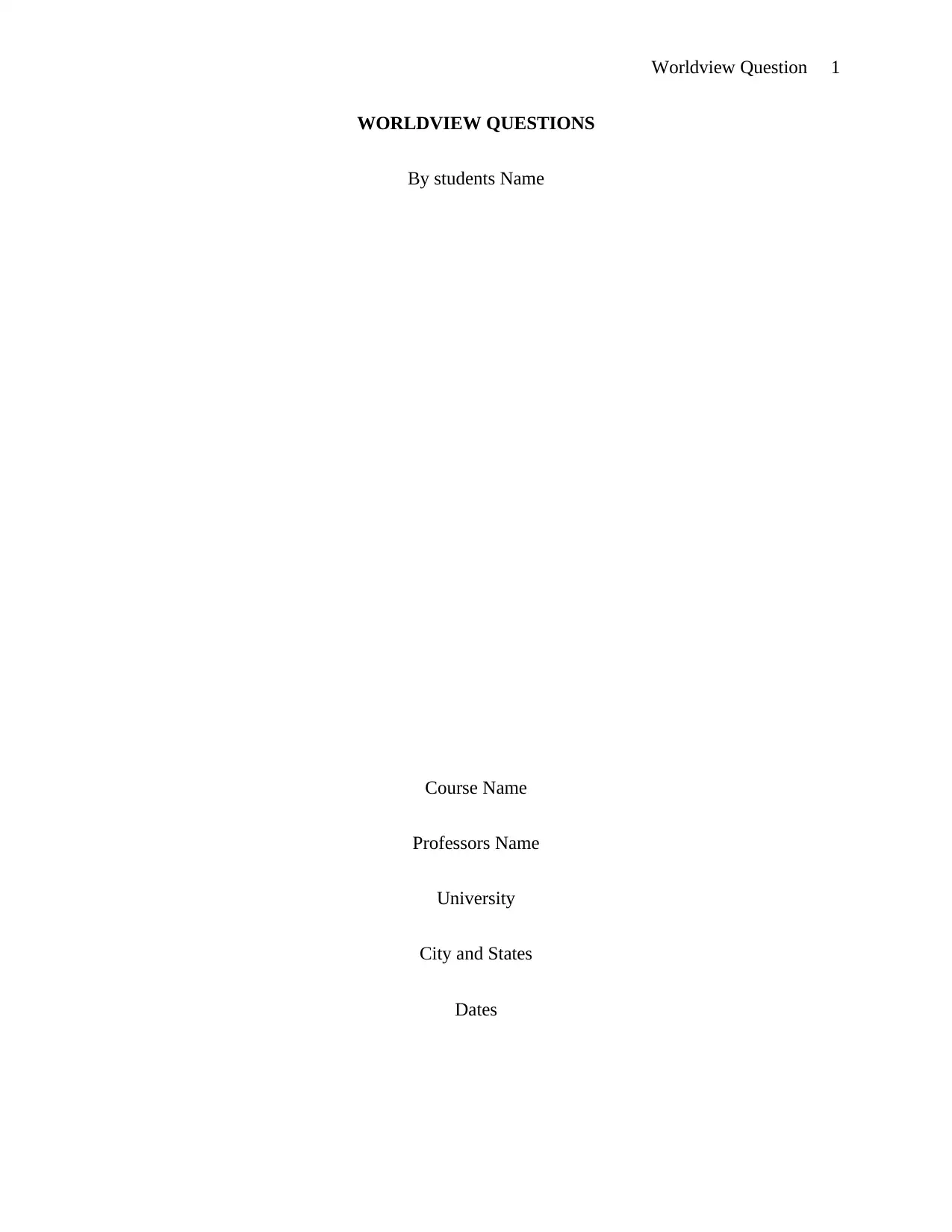
Worldview Question 1
WORLDVIEW QUESTIONS
By students Name
Course Name
Professors Name
University
City and States
Dates
WORLDVIEW QUESTIONS
By students Name
Course Name
Professors Name
University
City and States
Dates
Paraphrase This Document
Need a fresh take? Get an instant paraphrase of this document with our AI Paraphraser
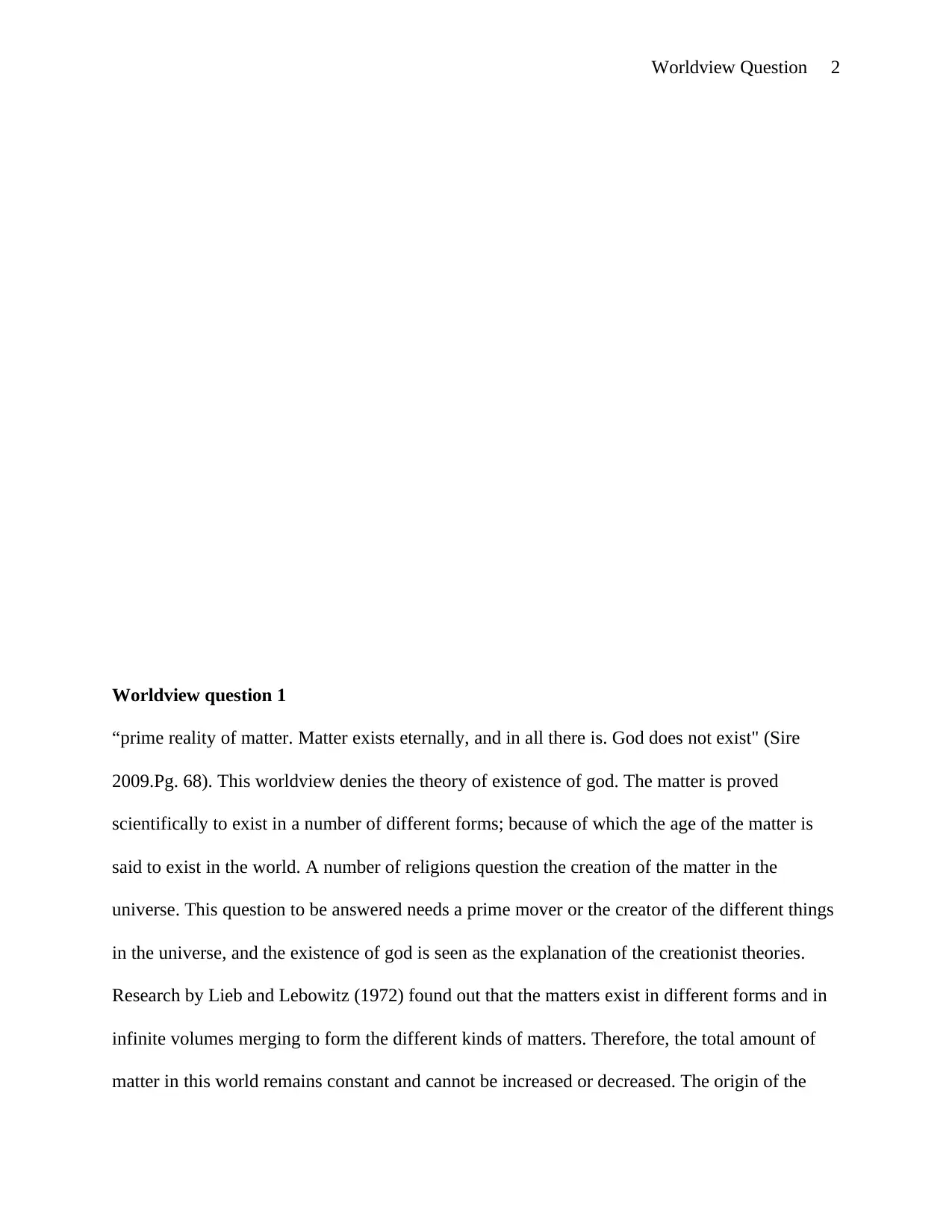
Worldview Question 2
Worldview question 1
“prime reality of matter. Matter exists eternally, and in all there is. God does not exist" (Sire
2009.Pg. 68). This worldview denies the theory of existence of god. The matter is proved
scientifically to exist in a number of different forms; because of which the age of the matter is
said to exist in the world. A number of religions question the creation of the matter in the
universe. This question to be answered needs a prime mover or the creator of the different things
in the universe, and the existence of god is seen as the explanation of the creationist theories.
Research by Lieb and Lebowitz (1972) found out that the matters exist in different forms and in
infinite volumes merging to form the different kinds of matters. Therefore, the total amount of
matter in this world remains constant and cannot be increased or decreased. The origin of the
Worldview question 1
“prime reality of matter. Matter exists eternally, and in all there is. God does not exist" (Sire
2009.Pg. 68). This worldview denies the theory of existence of god. The matter is proved
scientifically to exist in a number of different forms; because of which the age of the matter is
said to exist in the world. A number of religions question the creation of the matter in the
universe. This question to be answered needs a prime mover or the creator of the different things
in the universe, and the existence of god is seen as the explanation of the creationist theories.
Research by Lieb and Lebowitz (1972) found out that the matters exist in different forms and in
infinite volumes merging to form the different kinds of matters. Therefore, the total amount of
matter in this world remains constant and cannot be increased or decreased. The origin of the
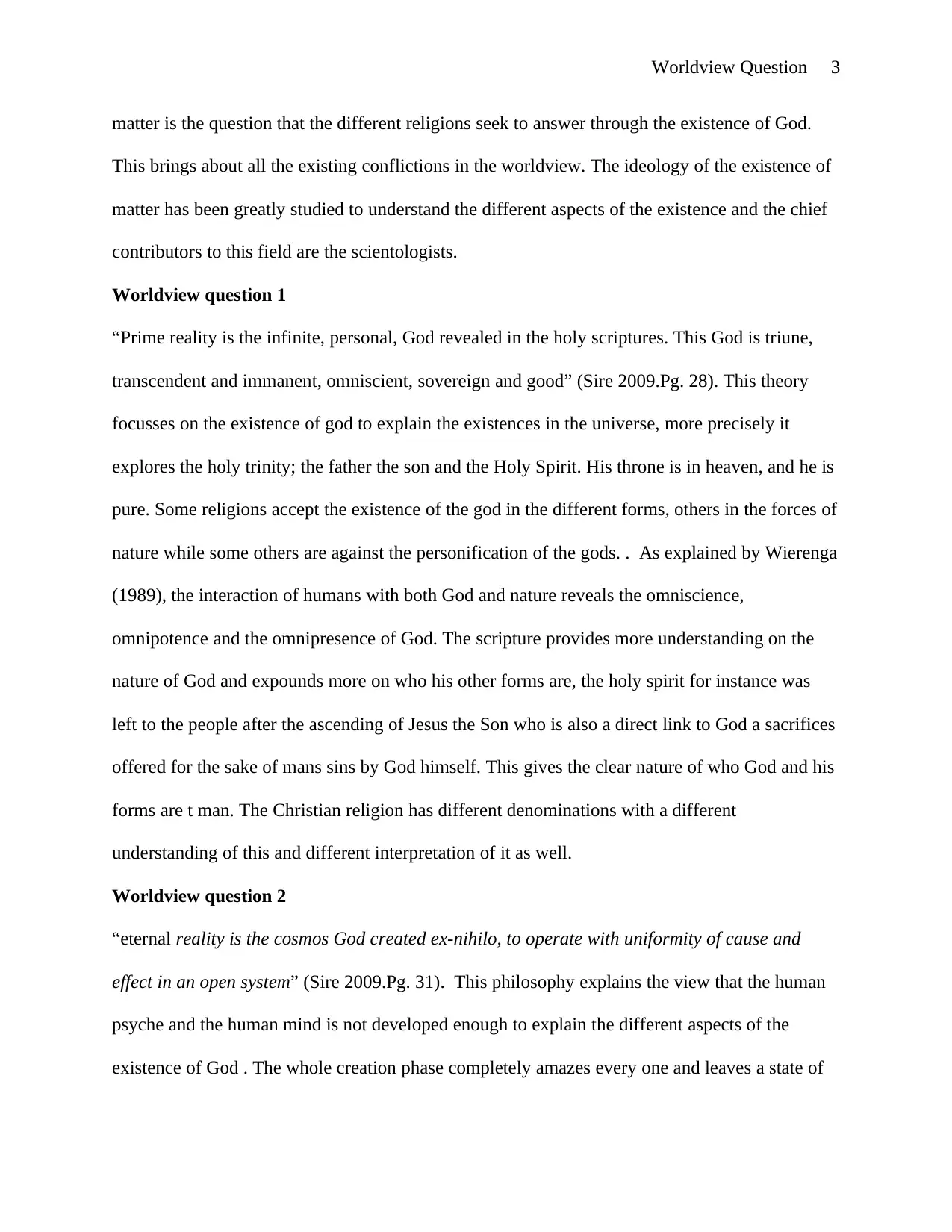
Worldview Question 3
matter is the question that the different religions seek to answer through the existence of God.
This brings about all the existing conflictions in the worldview. The ideology of the existence of
matter has been greatly studied to understand the different aspects of the existence and the chief
contributors to this field are the scientologists.
Worldview question 1
“Prime reality is the infinite, personal, God revealed in the holy scriptures. This God is triune,
transcendent and immanent, omniscient, sovereign and good” (Sire 2009.Pg. 28). This theory
focusses on the existence of god to explain the existences in the universe, more precisely it
explores the holy trinity; the father the son and the Holy Spirit. His throne is in heaven, and he is
pure. Some religions accept the existence of the god in the different forms, others in the forces of
nature while some others are against the personification of the gods. . As explained by Wierenga
(1989), the interaction of humans with both God and nature reveals the omniscience,
omnipotence and the omnipresence of God. The scripture provides more understanding on the
nature of God and expounds more on who his other forms are, the holy spirit for instance was
left to the people after the ascending of Jesus the Son who is also a direct link to God a sacrifices
offered for the sake of mans sins by God himself. This gives the clear nature of who God and his
forms are t man. The Christian religion has different denominations with a different
understanding of this and different interpretation of it as well.
Worldview question 2
“eternal reality is the cosmos God created ex-nihilo, to operate with uniformity of cause and
effect in an open system” (Sire 2009.Pg. 31). This philosophy explains the view that the human
psyche and the human mind is not developed enough to explain the different aspects of the
existence of God . The whole creation phase completely amazes every one and leaves a state of
matter is the question that the different religions seek to answer through the existence of God.
This brings about all the existing conflictions in the worldview. The ideology of the existence of
matter has been greatly studied to understand the different aspects of the existence and the chief
contributors to this field are the scientologists.
Worldview question 1
“Prime reality is the infinite, personal, God revealed in the holy scriptures. This God is triune,
transcendent and immanent, omniscient, sovereign and good” (Sire 2009.Pg. 28). This theory
focusses on the existence of god to explain the existences in the universe, more precisely it
explores the holy trinity; the father the son and the Holy Spirit. His throne is in heaven, and he is
pure. Some religions accept the existence of the god in the different forms, others in the forces of
nature while some others are against the personification of the gods. . As explained by Wierenga
(1989), the interaction of humans with both God and nature reveals the omniscience,
omnipotence and the omnipresence of God. The scripture provides more understanding on the
nature of God and expounds more on who his other forms are, the holy spirit for instance was
left to the people after the ascending of Jesus the Son who is also a direct link to God a sacrifices
offered for the sake of mans sins by God himself. This gives the clear nature of who God and his
forms are t man. The Christian religion has different denominations with a different
understanding of this and different interpretation of it as well.
Worldview question 2
“eternal reality is the cosmos God created ex-nihilo, to operate with uniformity of cause and
effect in an open system” (Sire 2009.Pg. 31). This philosophy explains the view that the human
psyche and the human mind is not developed enough to explain the different aspects of the
existence of God . The whole creation phase completely amazes every one and leaves a state of
⊘ This is a preview!⊘
Do you want full access?
Subscribe today to unlock all pages.

Trusted by 1+ million students worldwide
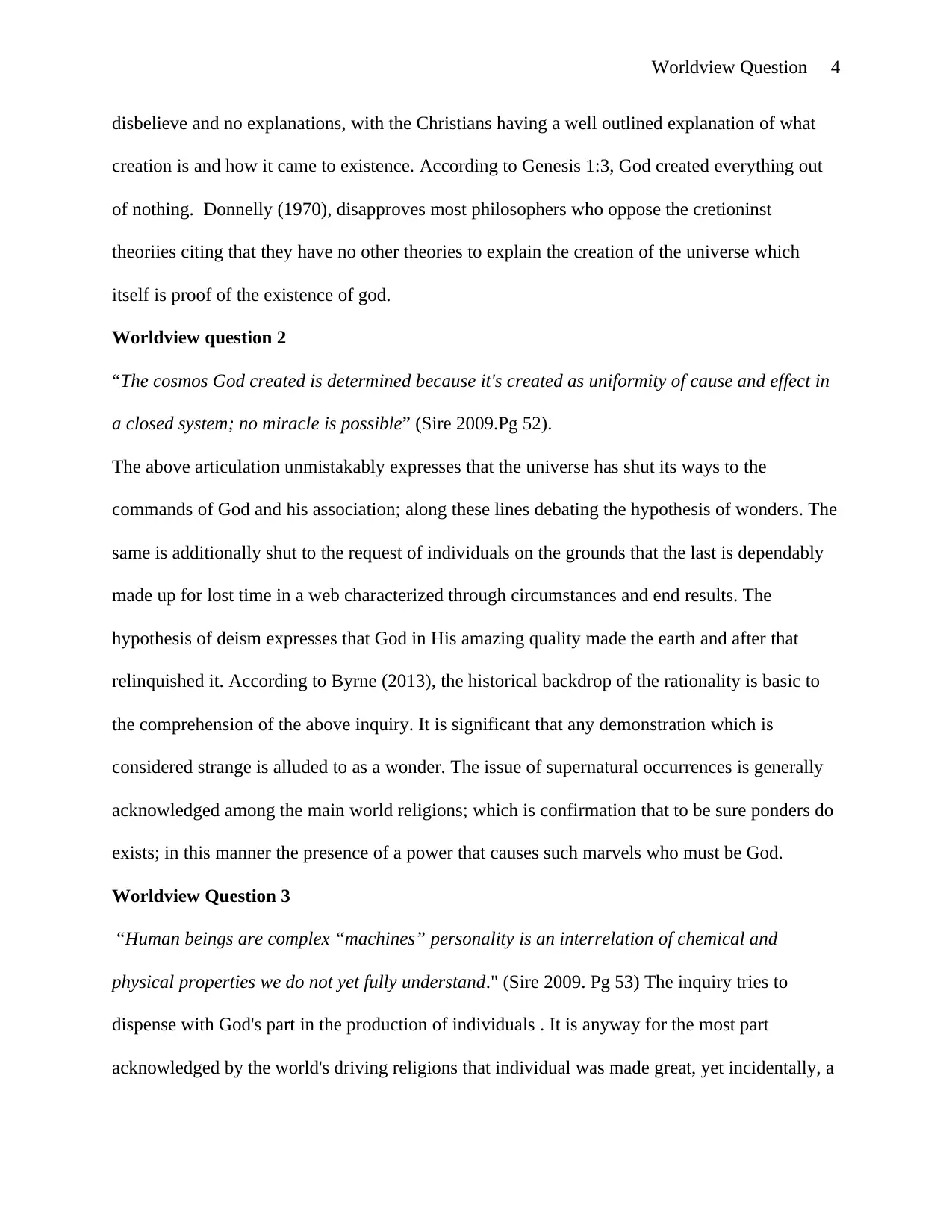
Worldview Question 4
disbelieve and no explanations, with the Christians having a well outlined explanation of what
creation is and how it came to existence. According to Genesis 1:3, God created everything out
of nothing. Donnelly (1970), disapproves most philosophers who oppose the cretioninst
theoriies citing that they have no other theories to explain the creation of the universe which
itself is proof of the existence of god.
Worldview question 2
“The cosmos God created is determined because it's created as uniformity of cause and effect in
a closed system; no miracle is possible” (Sire 2009.Pg 52).
The above articulation unmistakably expresses that the universe has shut its ways to the
commands of God and his association; along these lines debating the hypothesis of wonders. The
same is additionally shut to the request of individuals on the grounds that the last is dependably
made up for lost time in a web characterized through circumstances and end results. The
hypothesis of deism expresses that God in His amazing quality made the earth and after that
relinquished it. According to Byrne (2013), the historical backdrop of the rationality is basic to
the comprehension of the above inquiry. It is significant that any demonstration which is
considered strange is alluded to as a wonder. The issue of supernatural occurrences is generally
acknowledged among the main world religions; which is confirmation that to be sure ponders do
exists; in this manner the presence of a power that causes such marvels who must be God.
Worldview Question 3
“Human beings are complex “machines” personality is an interrelation of chemical and
physical properties we do not yet fully understand." (Sire 2009. Pg 53) The inquiry tries to
dispense with God's part in the production of individuals . It is anyway for the most part
acknowledged by the world's driving religions that individual was made great, yet incidentally, a
disbelieve and no explanations, with the Christians having a well outlined explanation of what
creation is and how it came to existence. According to Genesis 1:3, God created everything out
of nothing. Donnelly (1970), disapproves most philosophers who oppose the cretioninst
theoriies citing that they have no other theories to explain the creation of the universe which
itself is proof of the existence of god.
Worldview question 2
“The cosmos God created is determined because it's created as uniformity of cause and effect in
a closed system; no miracle is possible” (Sire 2009.Pg 52).
The above articulation unmistakably expresses that the universe has shut its ways to the
commands of God and his association; along these lines debating the hypothesis of wonders. The
same is additionally shut to the request of individuals on the grounds that the last is dependably
made up for lost time in a web characterized through circumstances and end results. The
hypothesis of deism expresses that God in His amazing quality made the earth and after that
relinquished it. According to Byrne (2013), the historical backdrop of the rationality is basic to
the comprehension of the above inquiry. It is significant that any demonstration which is
considered strange is alluded to as a wonder. The issue of supernatural occurrences is generally
acknowledged among the main world religions; which is confirmation that to be sure ponders do
exists; in this manner the presence of a power that causes such marvels who must be God.
Worldview Question 3
“Human beings are complex “machines” personality is an interrelation of chemical and
physical properties we do not yet fully understand." (Sire 2009. Pg 53) The inquiry tries to
dispense with God's part in the production of individuals . It is anyway for the most part
acknowledged by the world's driving religions that individual was made great, yet incidentally, a
Paraphrase This Document
Need a fresh take? Get an instant paraphrase of this document with our AI Paraphraser
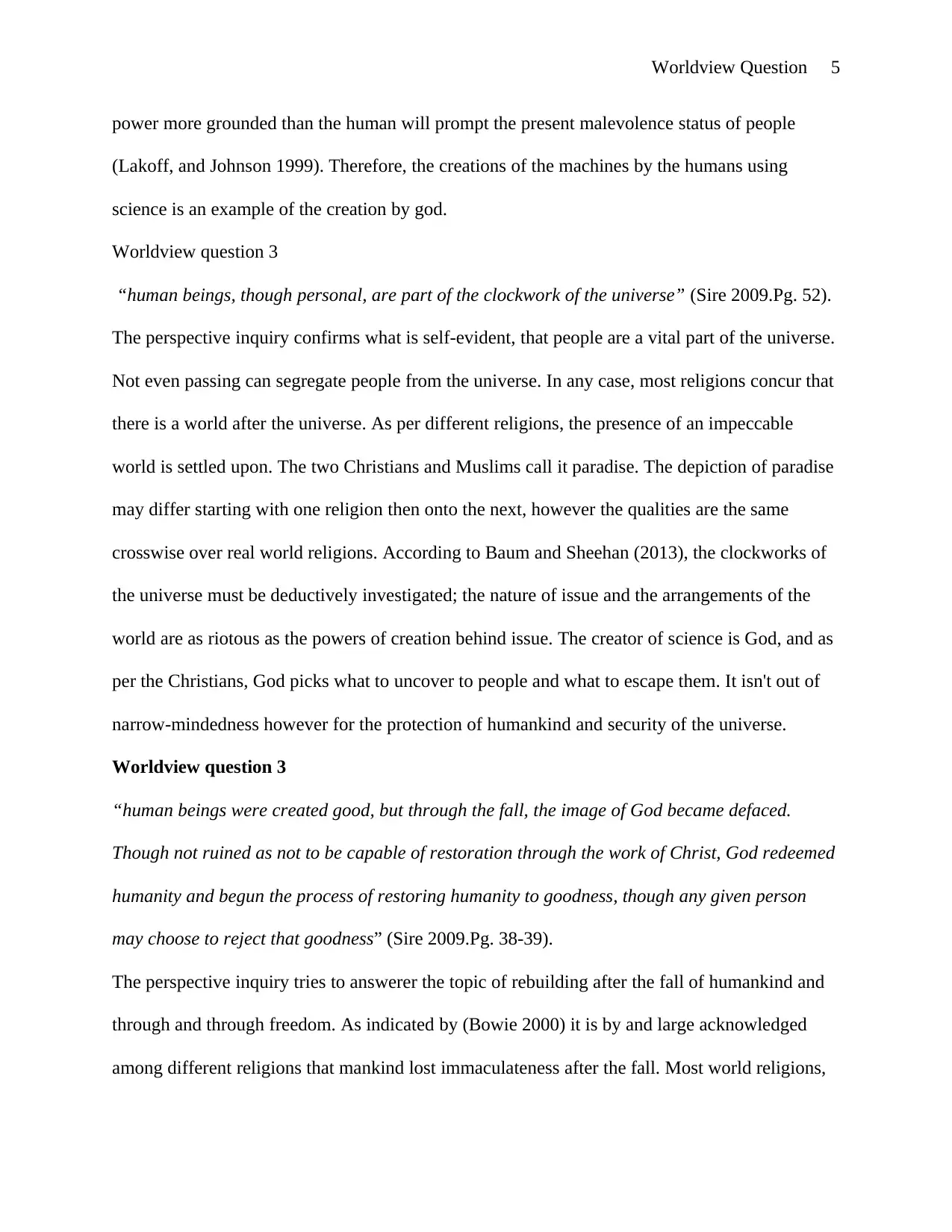
Worldview Question 5
power more grounded than the human will prompt the present malevolence status of people
(Lakoff, and Johnson 1999). Therefore, the creations of the machines by the humans using
science is an example of the creation by god.
Worldview question 3
“human beings, though personal, are part of the clockwork of the universe” (Sire 2009.Pg. 52).
The perspective inquiry confirms what is self-evident, that people are a vital part of the universe.
Not even passing can segregate people from the universe. In any case, most religions concur that
there is a world after the universe. As per different religions, the presence of an impeccable
world is settled upon. The two Christians and Muslims call it paradise. The depiction of paradise
may differ starting with one religion then onto the next, however the qualities are the same
crosswise over real world religions. According to Baum and Sheehan (2013), the clockworks of
the universe must be deductively investigated; the nature of issue and the arrangements of the
world are as riotous as the powers of creation behind issue. The creator of science is God, and as
per the Christians, God picks what to uncover to people and what to escape them. It isn't out of
narrow-mindedness however for the protection of humankind and security of the universe.
Worldview question 3
“human beings were created good, but through the fall, the image of God became defaced.
Though not ruined as not to be capable of restoration through the work of Christ, God redeemed
humanity and begun the process of restoring humanity to goodness, though any given person
may choose to reject that goodness” (Sire 2009.Pg. 38-39).
The perspective inquiry tries to answerer the topic of rebuilding after the fall of humankind and
through and through freedom. As indicated by (Bowie 2000) it is by and large acknowledged
among different religions that mankind lost immaculateness after the fall. Most world religions,
power more grounded than the human will prompt the present malevolence status of people
(Lakoff, and Johnson 1999). Therefore, the creations of the machines by the humans using
science is an example of the creation by god.
Worldview question 3
“human beings, though personal, are part of the clockwork of the universe” (Sire 2009.Pg. 52).
The perspective inquiry confirms what is self-evident, that people are a vital part of the universe.
Not even passing can segregate people from the universe. In any case, most religions concur that
there is a world after the universe. As per different religions, the presence of an impeccable
world is settled upon. The two Christians and Muslims call it paradise. The depiction of paradise
may differ starting with one religion then onto the next, however the qualities are the same
crosswise over real world religions. According to Baum and Sheehan (2013), the clockworks of
the universe must be deductively investigated; the nature of issue and the arrangements of the
world are as riotous as the powers of creation behind issue. The creator of science is God, and as
per the Christians, God picks what to uncover to people and what to escape them. It isn't out of
narrow-mindedness however for the protection of humankind and security of the universe.
Worldview question 3
“human beings were created good, but through the fall, the image of God became defaced.
Though not ruined as not to be capable of restoration through the work of Christ, God redeemed
humanity and begun the process of restoring humanity to goodness, though any given person
may choose to reject that goodness” (Sire 2009.Pg. 38-39).
The perspective inquiry tries to answerer the topic of rebuilding after the fall of humankind and
through and through freedom. As indicated by (Bowie 2000) it is by and large acknowledged
among different religions that mankind lost immaculateness after the fall. Most world religions,
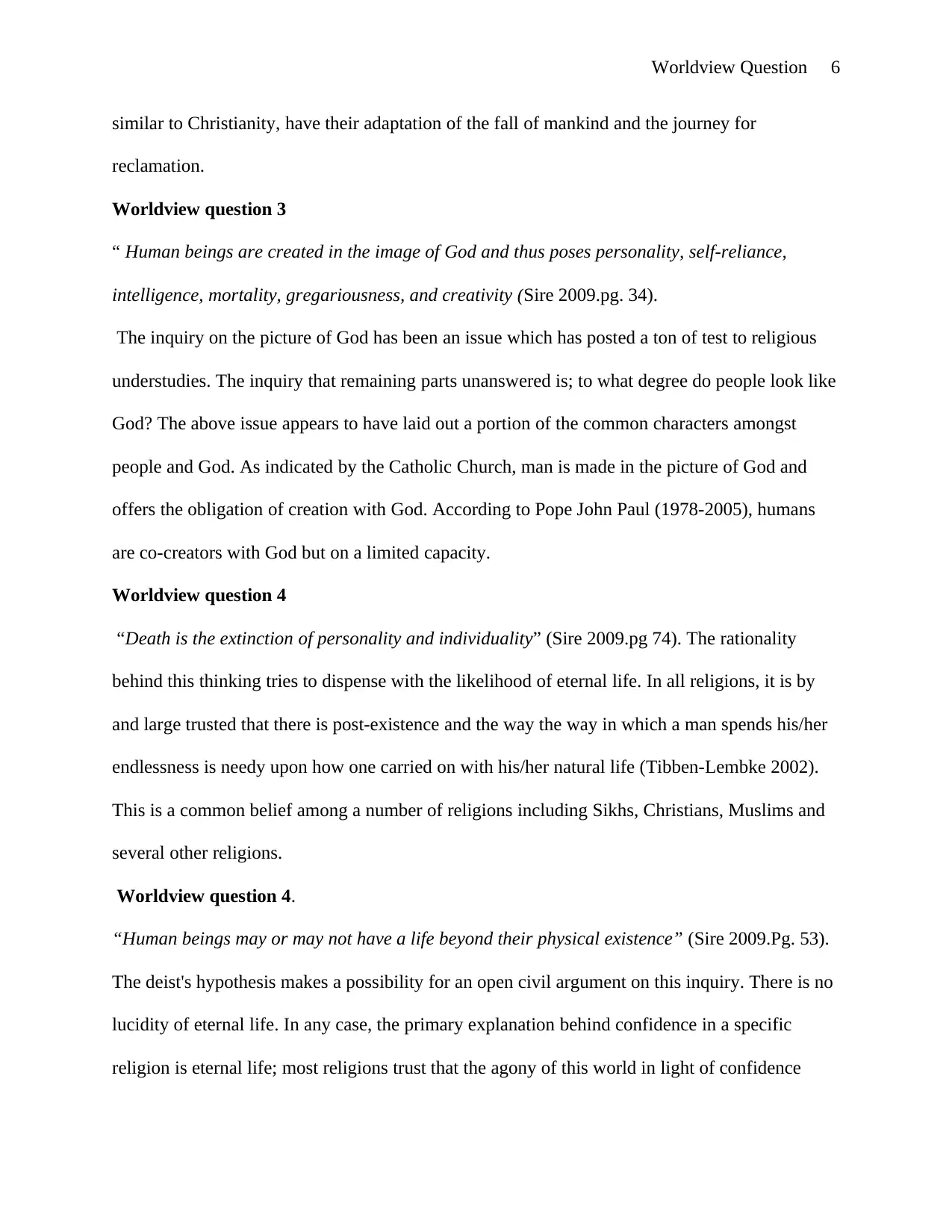
Worldview Question 6
similar to Christianity, have their adaptation of the fall of mankind and the journey for
reclamation.
Worldview question 3
“ Human beings are created in the image of God and thus poses personality, self-reliance,
intelligence, mortality, gregariousness, and creativity (Sire 2009.pg. 34).
The inquiry on the picture of God has been an issue which has posted a ton of test to religious
understudies. The inquiry that remaining parts unanswered is; to what degree do people look like
God? The above issue appears to have laid out a portion of the common characters amongst
people and God. As indicated by the Catholic Church, man is made in the picture of God and
offers the obligation of creation with God. According to Pope John Paul (1978-2005), humans
are co-creators with God but on a limited capacity.
Worldview question 4
“Death is the extinction of personality and individuality” (Sire 2009.pg 74). The rationality
behind this thinking tries to dispense with the likelihood of eternal life. In all religions, it is by
and large trusted that there is post-existence and the way the way in which a man spends his/her
endlessness is needy upon how one carried on with his/her natural life (Tibben-Lembke 2002).
This is a common belief among a number of religions including Sikhs, Christians, Muslims and
several other religions.
Worldview question 4.
“Human beings may or may not have a life beyond their physical existence” (Sire 2009.Pg. 53).
The deist's hypothesis makes a possibility for an open civil argument on this inquiry. There is no
lucidity of eternal life. In any case, the primary explanation behind confidence in a specific
religion is eternal life; most religions trust that the agony of this world in light of confidence
similar to Christianity, have their adaptation of the fall of mankind and the journey for
reclamation.
Worldview question 3
“ Human beings are created in the image of God and thus poses personality, self-reliance,
intelligence, mortality, gregariousness, and creativity (Sire 2009.pg. 34).
The inquiry on the picture of God has been an issue which has posted a ton of test to religious
understudies. The inquiry that remaining parts unanswered is; to what degree do people look like
God? The above issue appears to have laid out a portion of the common characters amongst
people and God. As indicated by the Catholic Church, man is made in the picture of God and
offers the obligation of creation with God. According to Pope John Paul (1978-2005), humans
are co-creators with God but on a limited capacity.
Worldview question 4
“Death is the extinction of personality and individuality” (Sire 2009.pg 74). The rationality
behind this thinking tries to dispense with the likelihood of eternal life. In all religions, it is by
and large trusted that there is post-existence and the way the way in which a man spends his/her
endlessness is needy upon how one carried on with his/her natural life (Tibben-Lembke 2002).
This is a common belief among a number of religions including Sikhs, Christians, Muslims and
several other religions.
Worldview question 4.
“Human beings may or may not have a life beyond their physical existence” (Sire 2009.Pg. 53).
The deist's hypothesis makes a possibility for an open civil argument on this inquiry. There is no
lucidity of eternal life. In any case, the primary explanation behind confidence in a specific
religion is eternal life; most religions trust that the agony of this world in light of confidence
⊘ This is a preview!⊘
Do you want full access?
Subscribe today to unlock all pages.

Trusted by 1+ million students worldwide
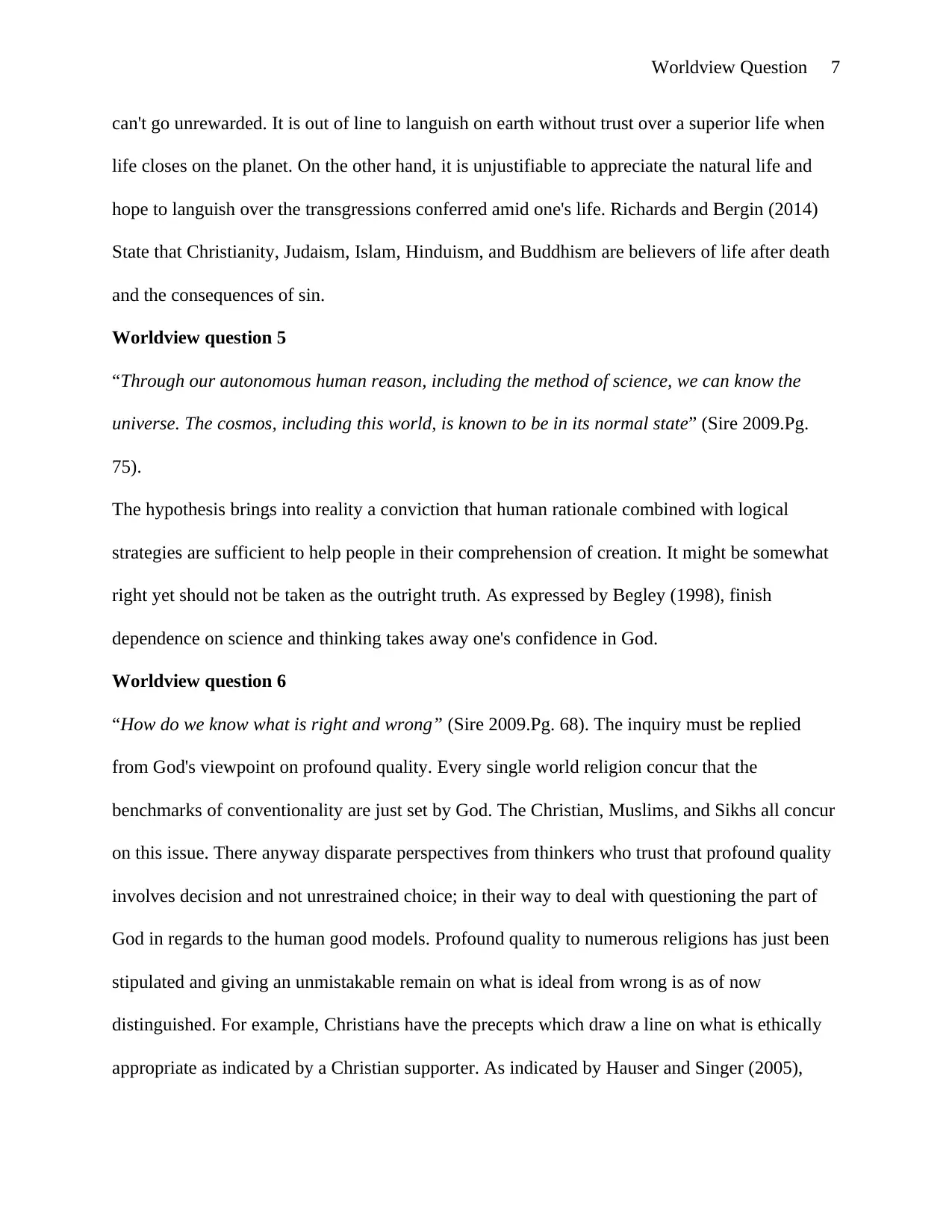
Worldview Question 7
can't go unrewarded. It is out of line to languish on earth without trust over a superior life when
life closes on the planet. On the other hand, it is unjustifiable to appreciate the natural life and
hope to languish over the transgressions conferred amid one's life. Richards and Bergin (2014)
State that Christianity, Judaism, Islam, Hinduism, and Buddhism are believers of life after death
and the consequences of sin.
Worldview question 5
“Through our autonomous human reason, including the method of science, we can know the
universe. The cosmos, including this world, is known to be in its normal state” (Sire 2009.Pg.
75).
The hypothesis brings into reality a conviction that human rationale combined with logical
strategies are sufficient to help people in their comprehension of creation. It might be somewhat
right yet should not be taken as the outright truth. As expressed by Begley (1998), finish
dependence on science and thinking takes away one's confidence in God.
Worldview question 6
“How do we know what is right and wrong” (Sire 2009.Pg. 68). The inquiry must be replied
from God's viewpoint on profound quality. Every single world religion concur that the
benchmarks of conventionality are just set by God. The Christian, Muslims, and Sikhs all concur
on this issue. There anyway disparate perspectives from thinkers who trust that profound quality
involves decision and not unrestrained choice; in their way to deal with questioning the part of
God in regards to the human good models. Profound quality to numerous religions has just been
stipulated and giving an unmistakable remain on what is ideal from wrong is as of now
distinguished. For example, Christians have the precepts which draw a line on what is ethically
appropriate as indicated by a Christian supporter. As indicated by Hauser and Singer (2005),
can't go unrewarded. It is out of line to languish on earth without trust over a superior life when
life closes on the planet. On the other hand, it is unjustifiable to appreciate the natural life and
hope to languish over the transgressions conferred amid one's life. Richards and Bergin (2014)
State that Christianity, Judaism, Islam, Hinduism, and Buddhism are believers of life after death
and the consequences of sin.
Worldview question 5
“Through our autonomous human reason, including the method of science, we can know the
universe. The cosmos, including this world, is known to be in its normal state” (Sire 2009.Pg.
75).
The hypothesis brings into reality a conviction that human rationale combined with logical
strategies are sufficient to help people in their comprehension of creation. It might be somewhat
right yet should not be taken as the outright truth. As expressed by Begley (1998), finish
dependence on science and thinking takes away one's confidence in God.
Worldview question 6
“How do we know what is right and wrong” (Sire 2009.Pg. 68). The inquiry must be replied
from God's viewpoint on profound quality. Every single world religion concur that the
benchmarks of conventionality are just set by God. The Christian, Muslims, and Sikhs all concur
on this issue. There anyway disparate perspectives from thinkers who trust that profound quality
involves decision and not unrestrained choice; in their way to deal with questioning the part of
God in regards to the human good models. Profound quality to numerous religions has just been
stipulated and giving an unmistakable remain on what is ideal from wrong is as of now
distinguished. For example, Christians have the precepts which draw a line on what is ethically
appropriate as indicated by a Christian supporter. As indicated by Hauser and Singer (2005),
Paraphrase This Document
Need a fresh take? Get an instant paraphrase of this document with our AI Paraphraser
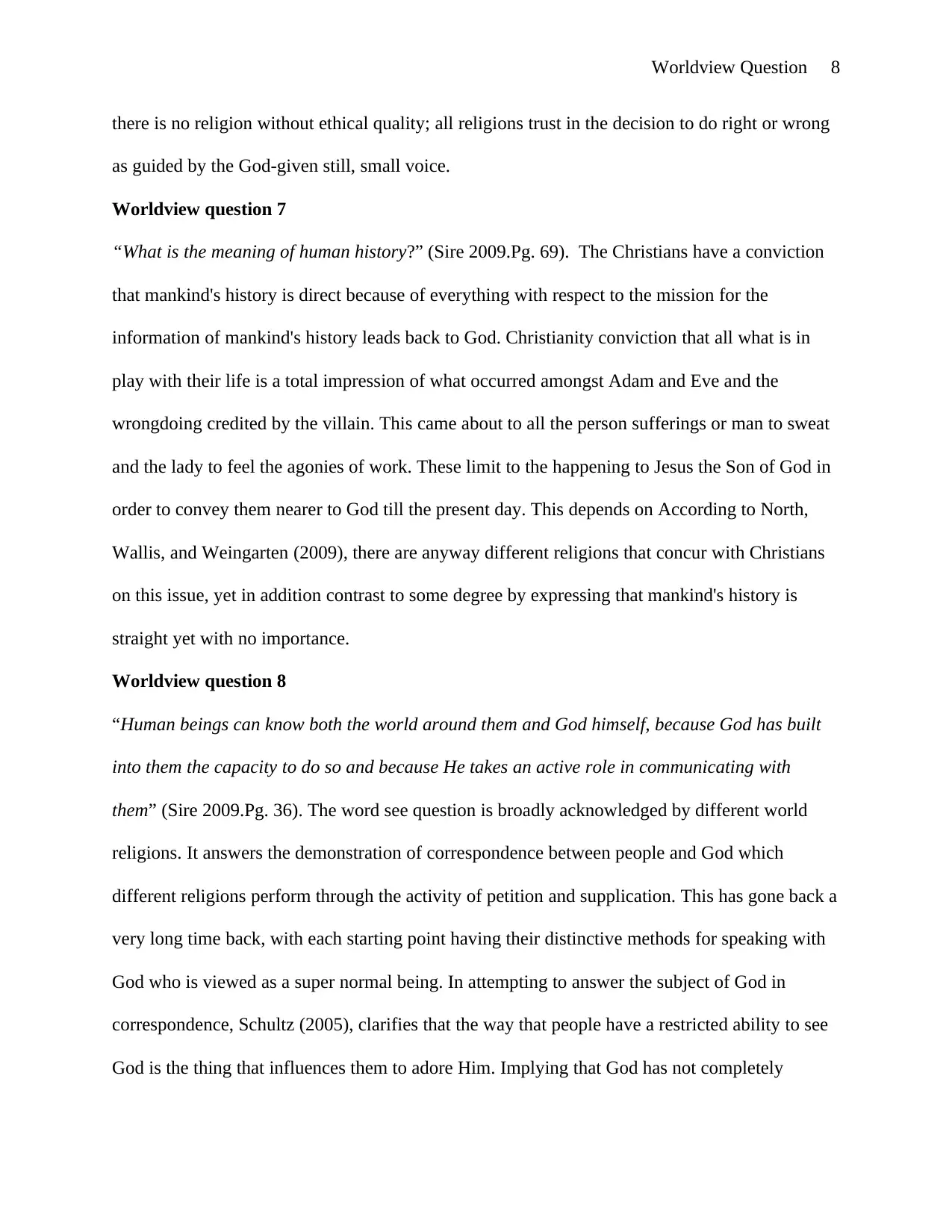
Worldview Question 8
there is no religion without ethical quality; all religions trust in the decision to do right or wrong
as guided by the God-given still, small voice.
Worldview question 7
“What is the meaning of human history?” (Sire 2009.Pg. 69). The Christians have a conviction
that mankind's history is direct because of everything with respect to the mission for the
information of mankind's history leads back to God. Christianity conviction that all what is in
play with their life is a total impression of what occurred amongst Adam and Eve and the
wrongdoing credited by the villain. This came about to all the person sufferings or man to sweat
and the lady to feel the agonies of work. These limit to the happening to Jesus the Son of God in
order to convey them nearer to God till the present day. This depends on According to North,
Wallis, and Weingarten (2009), there are anyway different religions that concur with Christians
on this issue, yet in addition contrast to some degree by expressing that mankind's history is
straight yet with no importance.
Worldview question 8
“Human beings can know both the world around them and God himself, because God has built
into them the capacity to do so and because He takes an active role in communicating with
them” (Sire 2009.Pg. 36). The word see question is broadly acknowledged by different world
religions. It answers the demonstration of correspondence between people and God which
different religions perform through the activity of petition and supplication. This has gone back a
very long time back, with each starting point having their distinctive methods for speaking with
God who is viewed as a super normal being. In attempting to answer the subject of God in
correspondence, Schultz (2005), clarifies that the way that people have a restricted ability to see
God is the thing that influences them to adore Him. Implying that God has not completely
there is no religion without ethical quality; all religions trust in the decision to do right or wrong
as guided by the God-given still, small voice.
Worldview question 7
“What is the meaning of human history?” (Sire 2009.Pg. 69). The Christians have a conviction
that mankind's history is direct because of everything with respect to the mission for the
information of mankind's history leads back to God. Christianity conviction that all what is in
play with their life is a total impression of what occurred amongst Adam and Eve and the
wrongdoing credited by the villain. This came about to all the person sufferings or man to sweat
and the lady to feel the agonies of work. These limit to the happening to Jesus the Son of God in
order to convey them nearer to God till the present day. This depends on According to North,
Wallis, and Weingarten (2009), there are anyway different religions that concur with Christians
on this issue, yet in addition contrast to some degree by expressing that mankind's history is
straight yet with no importance.
Worldview question 8
“Human beings can know both the world around them and God himself, because God has built
into them the capacity to do so and because He takes an active role in communicating with
them” (Sire 2009.Pg. 36). The word see question is broadly acknowledged by different world
religions. It answers the demonstration of correspondence between people and God which
different religions perform through the activity of petition and supplication. This has gone back a
very long time back, with each starting point having their distinctive methods for speaking with
God who is viewed as a super normal being. In attempting to answer the subject of God in
correspondence, Schultz (2005), clarifies that the way that people have a restricted ability to see
God is the thing that influences them to adore Him. Implying that God has not completely
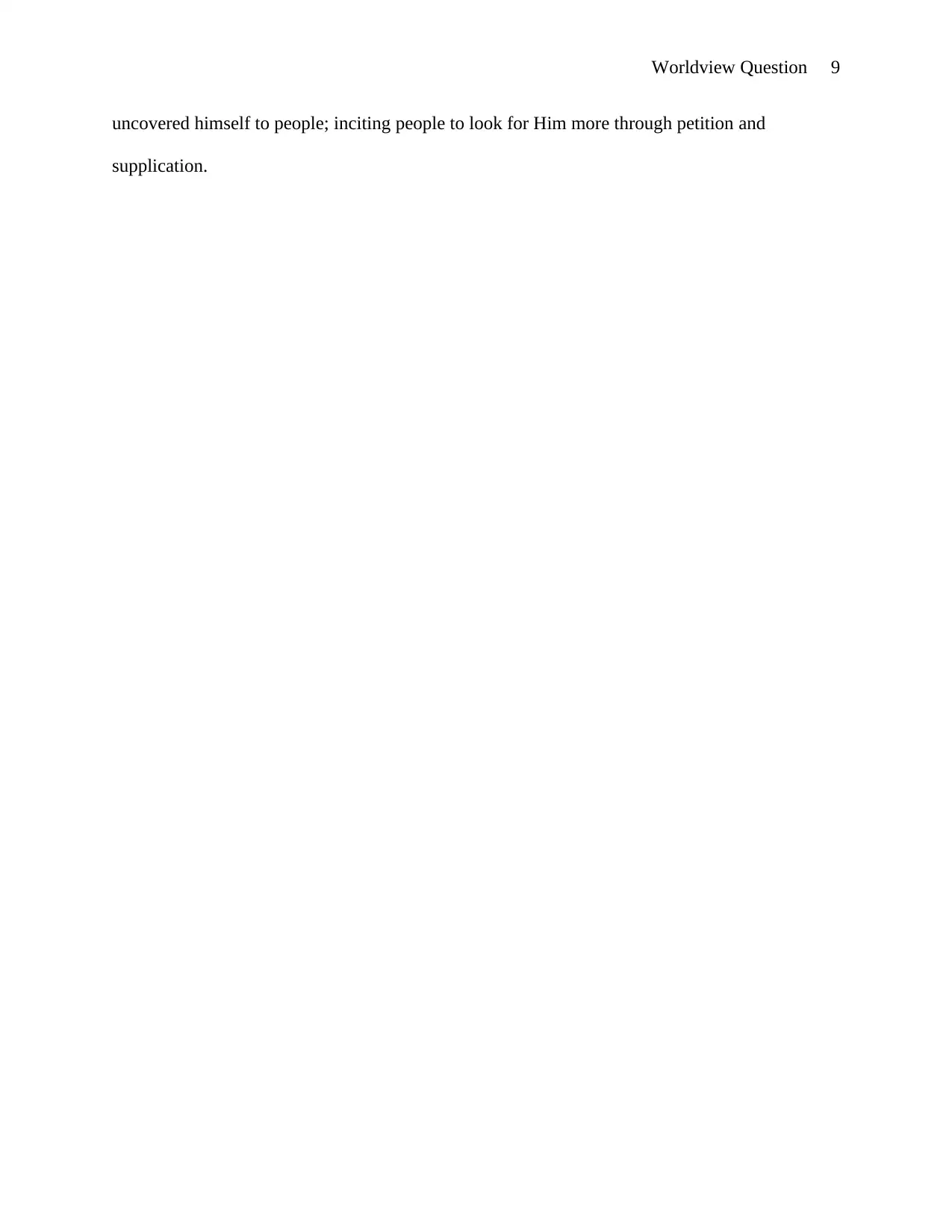
Worldview Question 9
uncovered himself to people; inciting people to look for Him more through petition and
supplication.
uncovered himself to people; inciting people to look for Him more through petition and
supplication.
⊘ This is a preview!⊘
Do you want full access?
Subscribe today to unlock all pages.

Trusted by 1+ million students worldwide
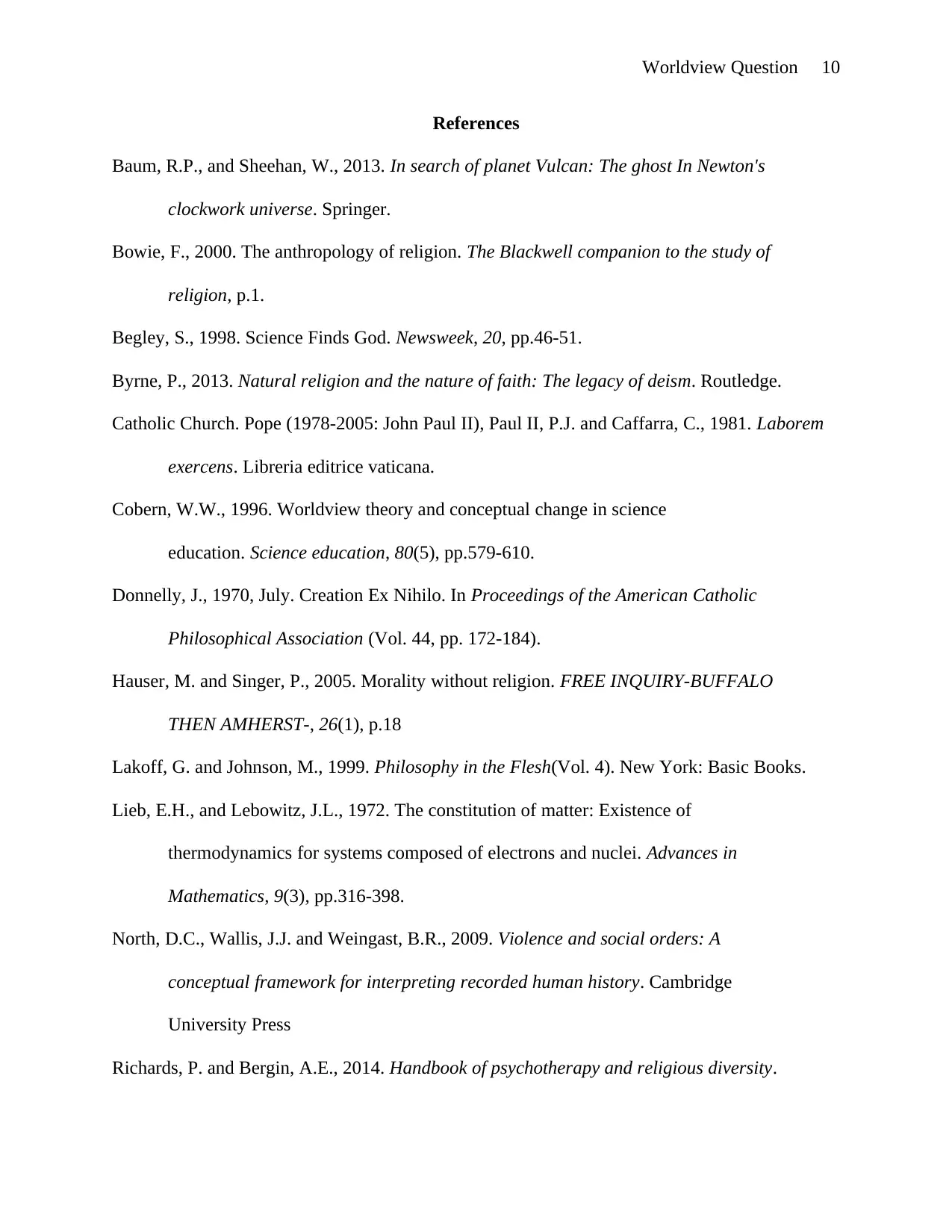
Worldview Question 10
References
Baum, R.P., and Sheehan, W., 2013. In search of planet Vulcan: The ghost In Newton's
clockwork universe. Springer.
Bowie, F., 2000. The anthropology of religion. The Blackwell companion to the study of
religion, p.1.
Begley, S., 1998. Science Finds God. Newsweek, 20, pp.46-51.
Byrne, P., 2013. Natural religion and the nature of faith: The legacy of deism. Routledge.
Catholic Church. Pope (1978-2005: John Paul II), Paul II, P.J. and Caffarra, C., 1981. Laborem
exercens. Libreria editrice vaticana.
Cobern, W.W., 1996. Worldview theory and conceptual change in science
education. Science education, 80(5), pp.579-610.
Donnelly, J., 1970, July. Creation Ex Nihilo. In Proceedings of the American Catholic
Philosophical Association (Vol. 44, pp. 172-184).
Hauser, M. and Singer, P., 2005. Morality without religion. FREE INQUIRY-BUFFALO
THEN AMHERST-, 26(1), p.18
Lakoff, G. and Johnson, M., 1999. Philosophy in the Flesh(Vol. 4). New York: Basic Books.
Lieb, E.H., and Lebowitz, J.L., 1972. The constitution of matter: Existence of
thermodynamics for systems composed of electrons and nuclei. Advances in
Mathematics, 9(3), pp.316-398.
North, D.C., Wallis, J.J. and Weingast, B.R., 2009. Violence and social orders: A
conceptual framework for interpreting recorded human history. Cambridge
University Press
Richards, P. and Bergin, A.E., 2014. Handbook of psychotherapy and religious diversity.
References
Baum, R.P., and Sheehan, W., 2013. In search of planet Vulcan: The ghost In Newton's
clockwork universe. Springer.
Bowie, F., 2000. The anthropology of religion. The Blackwell companion to the study of
religion, p.1.
Begley, S., 1998. Science Finds God. Newsweek, 20, pp.46-51.
Byrne, P., 2013. Natural religion and the nature of faith: The legacy of deism. Routledge.
Catholic Church. Pope (1978-2005: John Paul II), Paul II, P.J. and Caffarra, C., 1981. Laborem
exercens. Libreria editrice vaticana.
Cobern, W.W., 1996. Worldview theory and conceptual change in science
education. Science education, 80(5), pp.579-610.
Donnelly, J., 1970, July. Creation Ex Nihilo. In Proceedings of the American Catholic
Philosophical Association (Vol. 44, pp. 172-184).
Hauser, M. and Singer, P., 2005. Morality without religion. FREE INQUIRY-BUFFALO
THEN AMHERST-, 26(1), p.18
Lakoff, G. and Johnson, M., 1999. Philosophy in the Flesh(Vol. 4). New York: Basic Books.
Lieb, E.H., and Lebowitz, J.L., 1972. The constitution of matter: Existence of
thermodynamics for systems composed of electrons and nuclei. Advances in
Mathematics, 9(3), pp.316-398.
North, D.C., Wallis, J.J. and Weingast, B.R., 2009. Violence and social orders: A
conceptual framework for interpreting recorded human history. Cambridge
University Press
Richards, P. and Bergin, A.E., 2014. Handbook of psychotherapy and religious diversity.
Paraphrase This Document
Need a fresh take? Get an instant paraphrase of this document with our AI Paraphraser
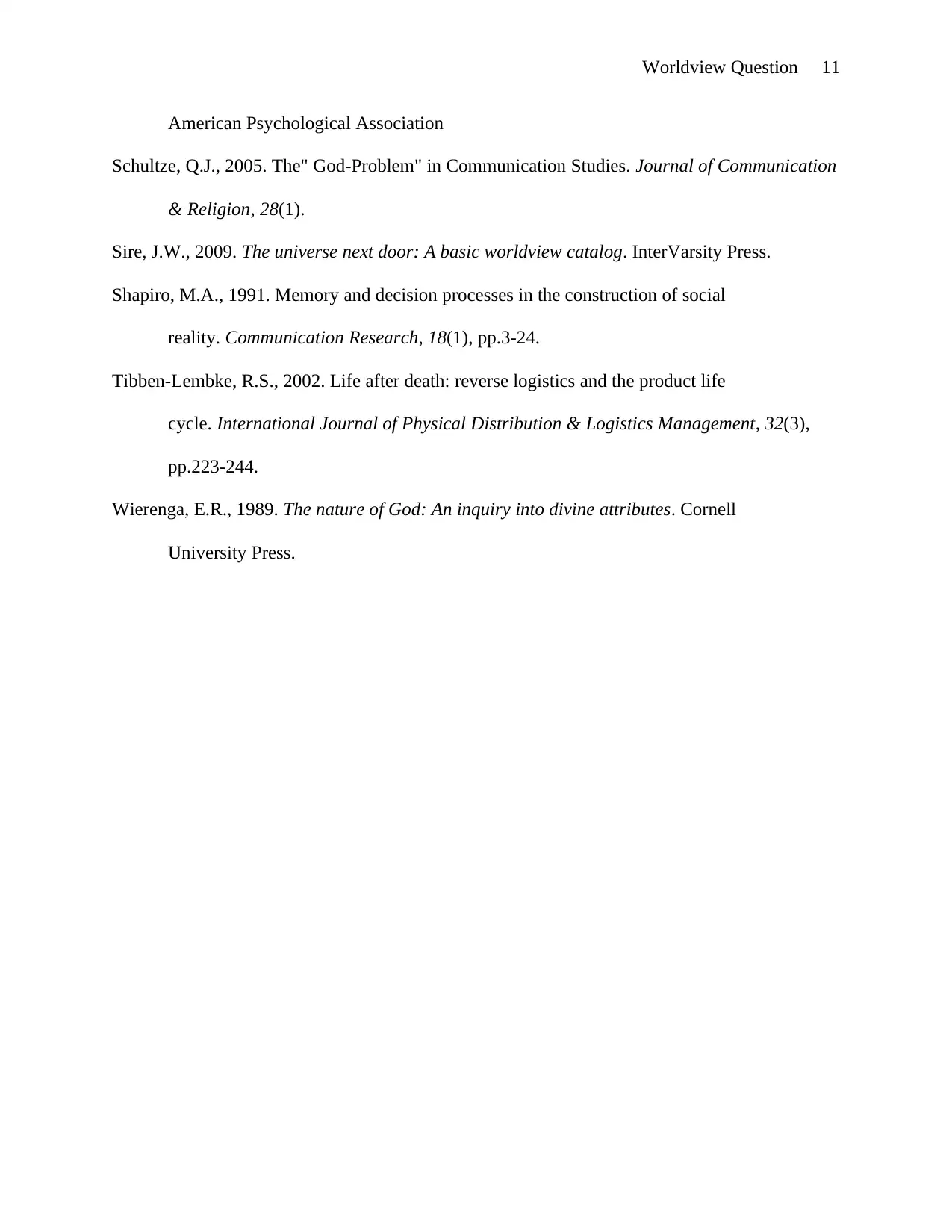
Worldview Question 11
American Psychological Association
Schultze, Q.J., 2005. The" God-Problem" in Communication Studies. Journal of Communication
& Religion, 28(1).
Sire, J.W., 2009. The universe next door: A basic worldview catalog. InterVarsity Press.
Shapiro, M.A., 1991. Memory and decision processes in the construction of social
reality. Communication Research, 18(1), pp.3-24.
Tibben-Lembke, R.S., 2002. Life after death: reverse logistics and the product life
cycle. International Journal of Physical Distribution & Logistics Management, 32(3),
pp.223-244.
Wierenga, E.R., 1989. The nature of God: An inquiry into divine attributes. Cornell
University Press.
American Psychological Association
Schultze, Q.J., 2005. The" God-Problem" in Communication Studies. Journal of Communication
& Religion, 28(1).
Sire, J.W., 2009. The universe next door: A basic worldview catalog. InterVarsity Press.
Shapiro, M.A., 1991. Memory and decision processes in the construction of social
reality. Communication Research, 18(1), pp.3-24.
Tibben-Lembke, R.S., 2002. Life after death: reverse logistics and the product life
cycle. International Journal of Physical Distribution & Logistics Management, 32(3),
pp.223-244.
Wierenga, E.R., 1989. The nature of God: An inquiry into divine attributes. Cornell
University Press.
1 out of 11
Related Documents
Your All-in-One AI-Powered Toolkit for Academic Success.
+13062052269
info@desklib.com
Available 24*7 on WhatsApp / Email
![[object Object]](/_next/static/media/star-bottom.7253800d.svg)
Unlock your academic potential
Copyright © 2020–2026 A2Z Services. All Rights Reserved. Developed and managed by ZUCOL.





